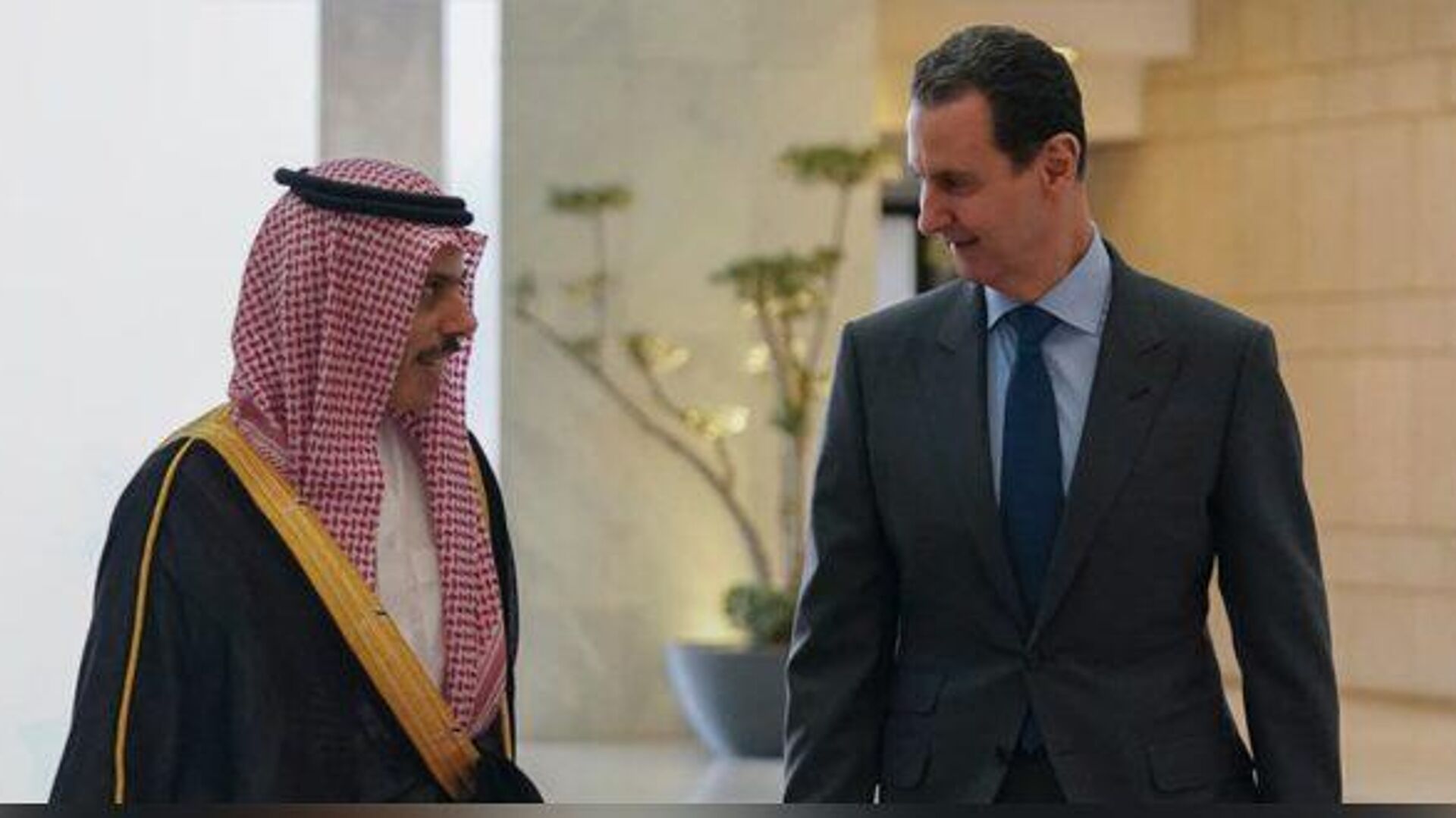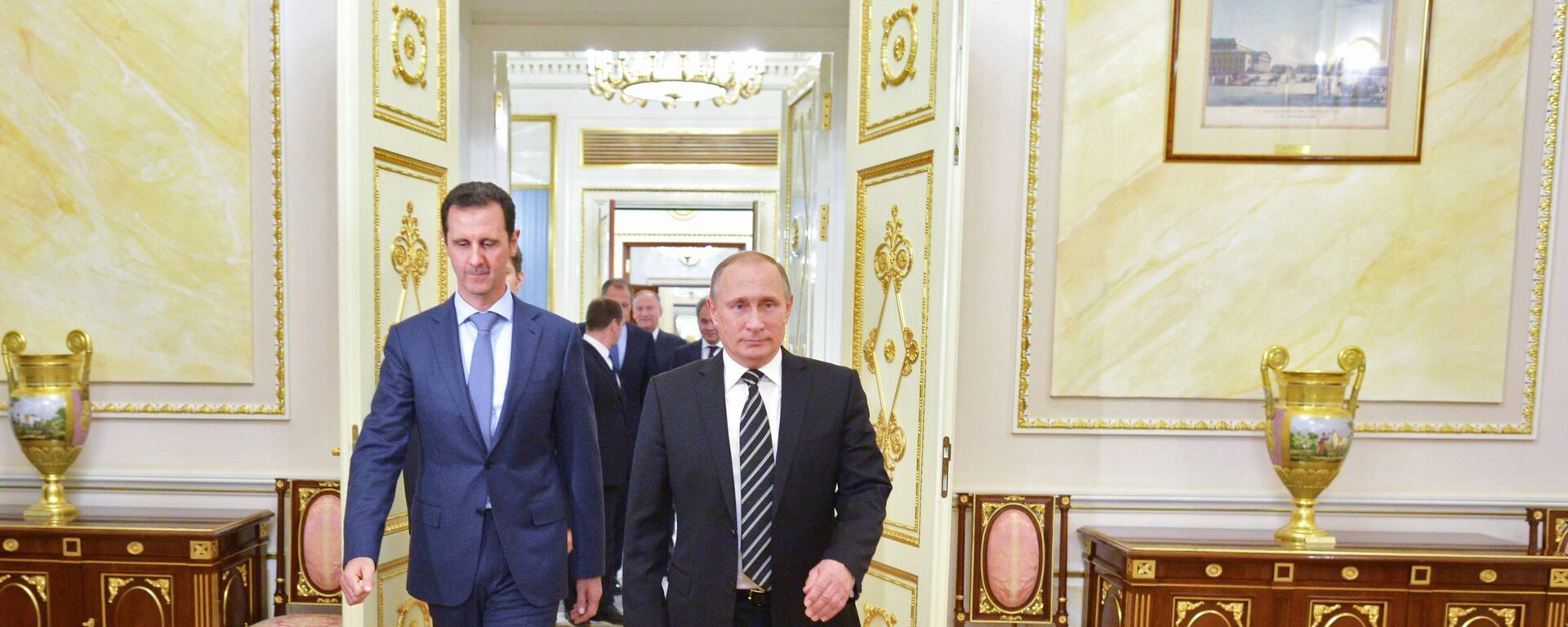https://sputnikglobe.com/20230418/middle-eastern-relations-shift-toward-rapprochement-1109640751.html
Middle Eastern Relations Shift Toward Rapprochement
Middle Eastern Relations Shift Toward Rapprochement
Sputnik International
The first visit by a Saudi FM to Damascus since 2011 confirms a regional policy shift that began last month with a Saudi-Iranian deal to restore relations, a retired Belgian MP told Sputnik.
2023-04-18T23:55+0000
2023-04-18T23:55+0000
2023-04-18T23:55+0000
world
syria
saudi arabia
middle east
us
russia
china
bashar al-assad
faisal mekdad
https://cdn1.img.sputnikglobe.com/img/07e7/04/12/1109635410_7:0:594:330_1920x0_80_0_0_b18e0495aca80d3641d6e07088ada2a4.jpg
The Tuesday meeting between President Bashar Assad and Saudi Arabia's Prince Faisal bin Farhan marks a high point in the flurry of diplomacy between Syria and the rich Arab Gulf kingdom that was once a key backer of rebels trying to depose Assad. The meeting comes just days after Syrian Foreign Minister Faisal Mekdad visited Riyadh for the first time in more than a decade.The Chinese-brokered pact between Iran and Saudi Arabia has changed attitudes to the Iranian-backed Syrian government in the Arab world. Saudi Arabia and the United Arab Emirates are now working to bring Syria back into the fold after its membership of the 22-nation Arab League was suspended when civil war broke out there in 2011.Carcaci, who has been to Syria twice as a lawmaker and continues monitoring the situation in the Middle East, said Damascus suddenly found itself a "fashionable destination" for diplomats. Foreign ministers of the UAE, Jordan and Egypt visited it in February, followed by the top Iranian diplomat in March."The handshake between Iran and Saudi Arabia under Chinese auspices is a real game-changer. And we see now the rapid warming of relations between Sunnis and Shia countries in the Middle East. There is a flurry of diplomatic activity under way in the region," the expert said.Carcaci described the shift underway in the Middle East as the "dawn of the multipolar world" that Russia and China have long aspired for, to counter the United States and its proxies.For Carcaci, this U-turn is the result of US President Joe Biden famously threatening to make Saudi Arabia "the pariah that they are," following the murder of Saudi dissident journalist Jamal Khashoggi."The US-Saudi relations are now in the deep-freezer. The Saudis even sell their oil to China in renminbi, and not in dollars anymore. De-dollarization of world trade is a major fear of the US. It shows the rapid decline of the US-European influence in the Middle East and Africa in general," the expert suggested.Carcaci said Biden could still blow on the embers of the fire in Syria, that have been weakening since his predecessor, Donald Trump, pulled American forces out of the Arab country's north in 2019, although it is much less likely to happen now.There is also a need for Bashar Assad to make peace with Turkey, which has been fighting it out with Kurdish militants in the northeast of Syria. Carcaci said that the role that China and Russia could still play in the Middle East in the coming years will be "fascinating" to watch from the diplomatic angle.
https://sputnikglobe.com/20230403/baby-steps-toward-peace-what-to-expect-from-russia-iran-syria-turkiye-meeting-in-moscow-1109055538.html
syria
saudi arabia
russia
china
Sputnik International
feedback@sputniknews.com
+74956456601
MIA „Rossiya Segodnya“
2023
Sputnik International
feedback@sputniknews.com
+74956456601
MIA „Rossiya Segodnya“
News
en_EN
Sputnik International
feedback@sputniknews.com
+74956456601
MIA „Rossiya Segodnya“
Sputnik International
feedback@sputniknews.com
+74956456601
MIA „Rossiya Segodnya“
president bashar assad, saudi arabia's prince faisal bin farhan, saudi fm faisal meets syrian assad, chinese-brokered pact between iran and saudi arabia, middle east relations, syria going back into arab league, fm visited syria
president bashar assad, saudi arabia's prince faisal bin farhan, saudi fm faisal meets syrian assad, chinese-brokered pact between iran and saudi arabia, middle east relations, syria going back into arab league, fm visited syria
Middle Eastern Relations Shift Toward Rapprochement
MOSCOW (Sputnik) - The first visit by a Saudi foreign minister to Damascus since 2011 confirms a regional policy shift that began last month with a Saudi-Iranian deal to restore relations, a retired Belgian lawmaker who met with the Syrian president twice told Sputnik.
The
Tuesday meeting between President Bashar Assad and Saudi Arabia's Prince Faisal bin Farhan marks a high point in the flurry of diplomacy between Syria and the rich Arab Gulf kingdom that was once a key backer of rebels trying to depose Assad. The meeting comes just days after Syrian Foreign Minister Faisal Mekdad visited Riyadh for the first time in more than a decade.
"The visits of both Ministers of Foreign Affairs of Syria and Saudi Arabia to the other capital is the sign of a real ‘rapprochement’ between Syria and Saudi Arabia. This policy shift is of geopolitical importance," Aldo Carcaci, a former member of the federal parliament in Brussels, told Sputnik.
The
Chinese-brokered pact between Iran and Saudi Arabia has changed attitudes to the Iranian-backed Syrian government in the Arab world. Saudi Arabia and the United Arab Emirates are now working to
bring Syria back into the fold after its membership of the 22-nation Arab League was suspended when civil war broke out there in 2011.
Carcaci, who has been to Syria twice as a lawmaker and continues monitoring the situation in the Middle East, said Damascus suddenly found itself a "fashionable destination" for diplomats. Foreign ministers of the UAE, Jordan and
Egypt visited it in February, followed by the top Iranian diplomat in March.
"The handshake between Iran and Saudi Arabia under Chinese auspices is a real game-changer. And we see now the rapid warming of relations between Sunnis and Shia countries in the Middle East. There is a flurry of diplomatic activity under way in the region," the expert said.
Carcaci described the shift underway in the Middle East as the "dawn of the multipolar world" that Russia and China have long aspired for, to counter the United States and its proxies.
"Gone is the secret agreement signed on the Quincy, the American warship, in February 1945, just after the Yalta conference, between [US President Franklin] Roosevelt and [King Abdul Aziz] Ibn Saud: US military ‘protection' against cheap oil," Carcaci said.
For Carcaci, this U-turn is the result of US President Joe Biden famously threatening to make Saudi Arabia "
the pariah that they are," following the murder of Saudi dissident journalist Jamal Khashoggi.
"The US-Saudi relations are now in the deep-freezer. The Saudis even sell their oil to China in renminbi, and not in dollars anymore. De-dollarization of world trade is a major fear of the US. It shows the
rapid decline of the US-European influence in the Middle East and Africa in general," the expert suggested.
Carcaci said Biden could still blow on the embers of the fire in Syria, that have been weakening since his predecessor, Donald Trump,
pulled American forces out of the Arab country's north in 2019, although it is much less likely to happen now.
There is also a need for Bashar Assad to make peace with Turkey, which has been fighting it out with Kurdish militants in the northeast of Syria. Carcaci said that the role that China and Russia could still play in the Middle East in the coming years will be "fascinating" to watch from the diplomatic angle.



